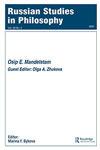列夫·托尔斯泰生活和工作中的伦理-宗教要求
IF 0.1
4区 哲学
Q4 Arts and Humanities
引用次数: 0
摘要
列夫·尼古拉耶维奇·托尔斯泰离开地球发生在1910年,这一年已经成为俄罗斯人的共同试金石。二十世纪象征性地结束了,开始了一个可怕的变革时代,这位俄罗斯作家的人文主义思想和宗教探索被烧毁和融化。可怕的时代似乎消耗了几个世纪以来人类珍视的一切:诗歌、信仰、道德、自由之爱;用托尔斯泰自己的话说,人类赖以生存的一切。奥斯威辛集中营之后,人们认为人是按照上帝的形象和肖像创造的优越而理性的存在,这种想法已经耗尽了所有的血液。但也许,多亏了他的天才,世界已经逐渐解冻,回归人类,重新凝视着他,但用托尔斯泰充满爱的眼睛。二十一世纪与托尔斯泰生命中的某些日期有关,这些日期不仅对我们,而且对世界文化都很重要。1901年2月20日至22日臭名昭著的《议会法案》讨论了托尔斯泰伯爵被逐出俄罗斯东正教会的问题,距今已经整整120年了。这一事件与其说是宗教性的,不如说是社会政治性的,这一事件对俄罗斯和世界各地成千上万人不断变化的意识产生了全球影响。教会高层的意图遭遇了相反的结果,因为托尔斯泰这个名字对好奇的人来说比以前更有吸引力。这导致了俄罗斯意识形态政治中典型的价值论倒置:托尔斯泰获得了制度“牺牲羔羊”的地位,这进一步证实了他对教会的批评是公正的。2021年6月10日,我们庆祝了另一个与托尔斯泰的生活世界有着血缘和精神联系的重要事件,即亚斯纳亚·波利亚纳国家博物馆庄园成立一百周年,该庄园当时是,现在仍然是“俄罗斯麦加”,是全世界人民的精神吸引力所在。本文章由计算机程序翻译,如有差异,请以英文原文为准。
The Ethico-Religious Imperatives of Lev Tolstoy’s Life and Work
Lev Nikolaevich Tolstoy’s departure from this earth took place in 1910, a year that has since become a common touchstone for Russians. The twentieth century came to a symbolic close, beginning a terrible era of changes that saw the Russian author’s humanist ideas and religious inquiries burned and melted down. The terrible age seemed to consume everything that humanity had valued over the centuries: poetry, faith, morality, freedom love; everything man lived by, to use Tolstoy’s own expression. After Auschwitz, the very thought of man as a superior and rational being created in the image and likeness of God was drained of all its blood. But perhaps, thanks to his genius, the world has gradually thawed and returned to man, gazing upon him anew, but with the loving eyes of Tolstoy. The twenty-first century is linked to certain dates in Tolstoy’s life that are important not only for us, but also for world culture. It has been exactly 120 years since the infamous Synodal Act of February 20–22, 1901, which discussed Count Tolstoy’s excommunication from the Russian Orthodox Church. This event was not so much religious as sociopolitical, an event with global consequences for the changing consciousness of many thousands of people in Russia and around the world. The intentions of the church hierarchs met with opposite results, as the name Tolstoy became much more attractive to inquiring minds than it had been before. This led to an axiological inversion typical of Russian ideological politics: Tolstoy gained the status of “sacrificial lamb” of the system, which served as additional confirmation that his criticism of the church was just. On June 10, 2021, we celebrated another important event linked by blood and spirit to the life world of Tolstoy, the centenary of the founding of the Yasnaya Polyana State Museum-Estate, which was then and remains now a “Russian Mecca,” a point of spiritual attraction for people all over the world.
求助全文
通过发布文献求助,成功后即可免费获取论文全文。
去求助
来源期刊

RUSSIAN STUDIES IN PHILOSOPHY
PHILOSOPHY-
CiteScore
0.10
自引率
0.00%
发文量
14
期刊介绍:
Russian Studies in Philosophy publishes thematic issues featuring selected scholarly papers from conferences and joint research projects as well as from the leading Russian-language journals in philosophy. Thematic coverage ranges over significant theoretical topics as well as topics in the history of philosophy, both European and Russian, including issues focused on institutions, schools, and figures such as Bakhtin, Fedorov, Leontev, Losev, Rozanov, Solovev, and Zinovev.
 求助内容:
求助内容: 应助结果提醒方式:
应助结果提醒方式:


